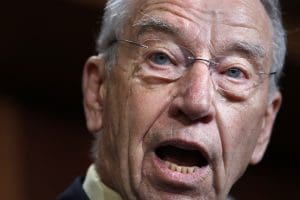Sen. Grassley is very upset about a plan to make rich people pay their taxes
Republican Sen. Chuck Grassley of Iowa doesn’t want the IRS to have the tools to crack down on rich tax evaders.

A provision in President Joe Biden’s American Families Plan would help the Internal Revenue Service crack down on wealthy tax cheats. Sen. Chuck Grassley (R-IA) is not pleased.
Noting that it was Tax Day, Grassley tweeted on Monday that while he is “all for catching tax cheats + closing tax gap,” Biden’s proposal “2pump more $$ into IRS & expand bank reporting is ripe for overreach + imposes more burdens on small biz/family farms.”
“If the IRS gets its eyeballs on personal bank accounts that’s a big can of worms for the tax collector 2decide who gets audited & why Don’t lose focus on taxpayer service to improve compliance,” he added.
Biden’s $1.8 trillion American Families Plan proposal would invest in free community college, child care, paid leave, and affordable health care. It would be funded by raising taxes for those making $400,000 or more annually and by cracking down on rich Americans who do not pay what they owe each year.
A recent White House fact sheet explained, “A recent study found that the top one percent failed to report 20 percent of their income and failed to pay over $175 billion in taxes that they owed. But today, the IRS does not even have the resources to fully investigate this evasion,” as budget cuts reduced audit rates for the very rich by 80% between 2011 and 2018.
To combat this, Biden proposes to “require financial institutions to report information on account flows so that earnings from investments and business activity are subject to reporting more like wages already are,” focusing solely on those earning more than $400,000. “Additional resources would focus on large corporations, businesses, and estates, and higher-income individuals,” the administration wrote. “Altogether, this plan would raise $700 billion over 10 years.”
The lack of enforcement — and steep cuts to IRS staff during the Donald Trump administration — has created a system in which the rich can evade paying what they owe with little chance of being caught. A 2019 ProPublica report found lower-income Americans were audited at about the same rate at the top 1%, discouraging them from taking deductions to which they are entitled and letting many top earners cheat without consequence.
“While the wealthy now have an open invitation to cheat, low-income taxpayers are receiving heightened scrutiny because they can be audited far more easily,” Sen. Ron Wyden (D-OR), now the Senate Finance Committee chair, told the outlet at the time. “We have two tax systems in this country and nothing illustrates that better than the IRS ignoring wealthy tax cheats while penalizing low-income workers over small mistakes.”
According to an April report by the Center for American Progress, stepped-up enforcement of the existing tax laws could mean both $1 trillion more in revenue each year and a more equitable system. “The richest 1 percent of Americans are responsible for an outsize share of the lost revenue—36 percent of unpaid individual income taxes by one recent estimate, or $175 billion per year,” it noted.
Seth Hanlon, a senior fellow at the center and one of the report’s authors, told The American Independent Foundation that Grassley’s comments indicate a misunderstanding of what the proposal’s impact would be on regular Americans, small businesses, and family farms. “This is just a smart expansion of information reporting that covers a major gap in the current system,” he said. By having banks report a couple more numbers than they already do, the government will be more likely to audit “bad apples” and leave everyone else alone.
“This isn’t really invasive at all,” Hanlon explained. “The whole point is it will let the IRS target audits in a smarter way, so honest people are gonna be less likely to be audited. People earning under $400,000 — as long as they’re tax compliant — are gonna be less likely to be audited. The audit rate for those earning under $400,000 won’t go up.”
Polling shows the idea of having richer Americans pay their fair share is widely popular. A late April poll by Monmouth University found 65% support for funding Biden’s spending proposals with increased revenue from those making more than $400,000, compared to 33% opposition.
An American Banker report on Monday noted that the banking industry is not thrilled with the idea of having to report more information to the IRS, suggesting they do not want to be tax police.
Hanlon called this argument “nutty.”
“Information reporting is a normal part of the tax system. Every single employer in the country issues W-2 forms. Are they the cops for the IRS? No. It’s just part of the compliance system. Every bank issues 1099-INTs for all customers with at least $10 of interest,” he noted.
According to the Center for Responsive Politics, Grassley has received millions of dollars in PAC contributions from the financial sector since 2014.
Published with permission of The American Independent Foundation.
Recommended

Biden calls for expanded child tax credit, taxes on wealthy in $7.2 trillion budget plan
President Joe Biden released his budget request for the upcoming fiscal year Monday, calling on Congress to stick to the spending agreement brokered last year and to revamp tax laws so that the “wealthy pay their fair share.”
By Jennifer Shutt, States Newsroom - March 11, 2024
December jobs report: Wages up, hiring steady as job market ends year strong
Friday’s jobs data showed a strong, resilient U.S. labor market with wages outpacing inflation — welcome news for Americans hoping to have more purchasing power in 2024.
By Casey Quinlan - January 05, 2024
Biden’s infrastructure law is boosting Nevada’s economy. Sam Brown opposed it.
The Nevada Republican U.S. Senate hopeful also spoke out against a rail project projected to create thousands of union jobs
By Jesse Valentine - November 15, 2023









































































